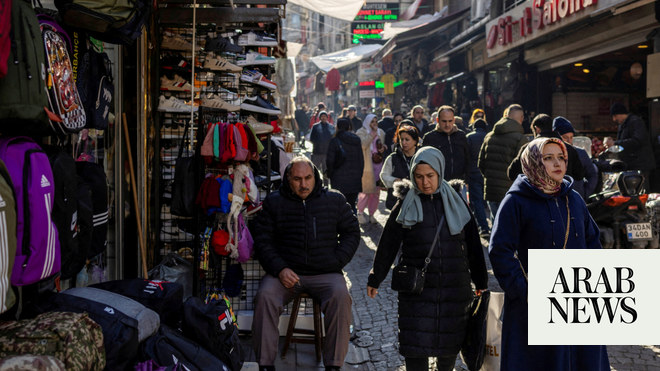
Measures to reduce luxury spending in public sector under a savings plan unveiled on Monday have symbolic value, analyst tells Arab News
ANKARA: With local elections over, Turkiye’s Vice President Cevdet Yilmaz and Finance Minister Mehmet Simsek on Monday unveiled the much-awaited austerity plan as the country trends toward orthodox policies to ensure its fiscal discipline and a lasting price stability amid rocketing inflation rates.
One thing is clear: To attract investors and curb inflation, Turkiye needs to continue with tax reform and austerity measures in the public sector. So, the bitter medicine is not just for ordinary citizens.
According to the austerity plan, Turkiye is taking strict measures to curb public spending, with only essential state investment projects to be launched in the coming period.
Priority will be given to investment projects with physical progress of more than 75 per cent, projects planned in earthquake zones, green and digital transformation projects, and port-railway projects near industrial zones.
However, experts are skeptical about the implementation of the measures and see them merely as gesture of goodwill that falls short of expectations.
Beyond symbolic measures such as reducing the number of luxury and unnecessary public vehicles or limiting the number of public sector employees, the focus is now on the direction and scope of a meaningful fiscal policy to curb inflationary pressures.
Wolfango Piccoli, co-president of Teneo Intelligence in London, says the new measures do not resemble a coherent package to strengthen fiscal discipline, but are instead a move to appease Turkish voters who are increasingly worried about the rising cost of living.
“Moreover, past similar initiatives have shown that implementing (and monitoring) austerity measures applied to Turkiye’s bloated state apparatus will be challenging,” he said.
“Some of the more eye-catching measures, such as a freeze on the purchase and rental of new vehicles and a limit on hiring new staff, will have a limited impact on 2024 budget spending,” he said.
Piccoli believes that the package aims primarily to bring some control over the public administration but will not repair the deep economic damage caused by the economic policies of recent years.
Turkiye’s annual inflation rate climbed to almost 70 percent in April, and the central bank’s latest quarterly inflation report expects it to peak at 75 percent to 76 percent next month.
By the end of the year, the central bank anticipates that inflation will be brought down to 38 percent.
However, a recent joint study by Koc University and KONDA Research has revealed that households’ year-end inflation expectations rose to 96 percent, up from 72 percent recorded last January.
Departing from its traditional policy, the Turkish Central Bank has already raised its key interest rate by 4,150 basis points since last year.
Under the austerity package, public institutions will be prohibited from purchasing and renting new vehicles and from buying or constructing new buildings for three years.
The salaries of civil servants serving on boards of directors will be restricted. Activities such as trips, cocktails, and dinners will not be organized except for international meetings and national holidays.
At the launch of the package, Simsek said the government would make additional reforms to public finances and accelerate structural reforms.
The number of new public sector employees will for three years be limited to those needed to replace retiring workers, while the funds allocated for purchasing goods and services by state institutions will be reduced by 10 percent and those for investments by 15 percent.
Economy czar Simsek, who was in the US in April for meetings with the World Bank, International Monetary Fund, G20 and many fund managers, expressed confidence in Turkiye’s improving credit rating after S&P’s recent upgrade from B to B+. He attributed this to improved policy coordination and external rebalancing.
“The continuous decline in the annual current account deficit over the last eight months is a success of our program,” he said.
“With the decline in the current account deficit and the positive outlook for external financial inflows, the improvement in our foreign exchange reserves will continue,” he added.
The leader of the main opposition Republican People’s Party, Ozgur Ozel, likened the new plan to a “disguised IMF program.”
Turkiye posted a current account deficit of $4.5 billion in March. Because Simsek did not say how much the austerity package would reduce the deficit in the 2024 budget, experts point out the impossibility of assessing performance.
Piccoli said: “It is expected that in the best-case scenario, the measures will lead to savings of around TL100 billion to TL150 billion ($3.1 billion to $4.65 billion).
“The government"s 2024 budget deficit is about TL2.4 trillion, so Simsek’s austerity package amounts to a rounding error,” Piccoli said.
“It is not a coherent, credible austerity plan supporting the disinflation process. At best, it is a show of goodwill. Even if 150 billion liras of savings are realized, the budget deficit will be above 6 percent of GDP in 2024,” he added.
Experts stress the need for a comprehensive and focused reform program with a clear timetable to build confidence in the newly announced measures.
Selva Demiralp, a professor of economics at Koc University in Istanbul, reflects on the early 2000s when Turkey faced a previous major economic crisis. At that time, Kemal Dervis, brought in from the United States, was appointed as the state minister in charge of the economy. He was sworn in on March 13, 2001 and subsequently announced the “Transition to a Strong Economy” program on April 14.
“In that program, steps were taken to increase transparency in public procurement, abolish incentives for low-productivity areas, expand the tax base through the use of tax identification numbers, and increase tax penalties. With the new measures announced today, we see steps towards increasing tax penalties, which is a positive move. Similarly, measures to reduce luxury expenditures in the public sector carry symbolic value,” Demiralp told Arab News.
“If we are entering a period of ‘bitter medicine’ for the economy, it is crucial to signal that the burden is shared not only by fixed-income earners but also by the highest-ranking public sector bureaucrats,” Demiralp added.
However, Demiralp pointed out that luxury expenditures constitute a small proportion of the state budget.
“The main waste stems from non-transparent expenditures such as tenders and incentives in inefficient sectors. We do not see any steps towards transparency in this regard. Academic studies by Turkish professor Ufuk Akcigit show that Turkey is one of the countries providing the most incentives, but these incentives are neither controlled nor monitored,” she said.
Demiralp believes that reducing civil servants’ wages in real terms should not be part of austerity measures. “It is important to anchor inflation expectations and align salary increases with these expectations. However, if we are to achieve this, the central bank must ‘do whatever it takes’ to meet the inflation targets, ensuring that salaried employees are not adversely affected,” she emphasized.
“Foreign investors will value the signaling aspect of the package. Contractionary fiscal policy, in conjunction with tight monetary policy, will undoubtedly assist the central bank,” she said.
“From a foreign investor’s perspective, the primary concern is whether aggregate demand is being restrained, rather than the societal distribution of the austerity program’s costs. Therefore, they will likely be less concerned about the burden placed on fixed-income groups, which I previously highlighted.”












